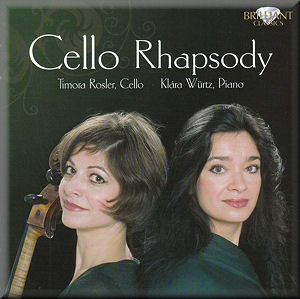 |
 |
|


alternatively
CD: MDT
AmazonUK
AmazonUS
|
Cello Rhapsody
Frédéric CHOPIN (1810-1849)
Polonaise brillante in C major, Op.3 (1828/30) [8:27]
Manuel de FALLA (1876-1946)
Suite populaire espagnole (after Siete canciones populares Españolas,
1914) [12:20]
Claude DEBUSSY (1862-1918)
Sonata for Cello and Piano, L.135 (1915) [10:19]
Benjamin BRITTEN (1913-1976)
Sonata for Cello and Piano in C major (1960) [18:55]
Béla BARTÓK (1881-1945)
Rhapsody No.1 for Violin and Piano, Sz.88 (1928, cello transcription
1929) [9:09]
Franz SCHUBERT (1797-1828)
Sonata for Arpeggione in A minor, D.821 (1824) [22:42]
Bohuslav MARTINŮ
(1890-1959)
Variations on a theme of Rossini, H.290 (1942) [7:34]
Dmitri SHOSTAKOVICH (1906-1975)
Sonata for Cello and Piano in D minor, Op.40 (1934) [25:23]
 Timora Rosler (cello), Klára Würtz (piano)
Timora Rosler (cello), Klára Würtz (piano)
rec. September 1997, Church Kortenhoef, the Netherlands; May 2001,
Doopsgezinde Gemeente Deventer. DDD.
 BRILLIANT CLASSICS 9157 [59:02 + 54:17]
BRILLIANT CLASSICS 9157 [59:02 + 54:17] 
|
|
|
This release is a combination of two earlier ones. Disc One
is the first part of the double disc "The Romantic Cello" (Brilliant
Classics 99758). The second disc there was devoted to concertante
works for cello, also with Timora Rosler. Disc One was released
on Arsis/Bellaphon - and seems to be extinct. The combined works
under the new roof are not quite the perfect neighbors. There’s
Chopin and Schubert on one end and Shostakovich and Britten
on the other. I doubt that anyone will often be in the mood
to listen to these extremes at the same time, and especially
when they are interleaved. Still, the works are performed well
and, if you listen to them separately, provide an enjoyable
experience.
The main feature of the album is the warm, ripe sound of Timora
Rosler’s cello - it's a Thomas Dodd instrument from 1800.
Sometimes it sounds a bit watery, syrupy even, but never falls
into wobbliness. As a consequence, Romantic music sounds very
Romantic, and non-Romantic becomes a little Romantic as well.
This quality can be best appreciated in works that employ the
cello as a singer, where the instrument is not in a hurry and
has time to shape the notes. Such is Chopin’s Polonaise
brillante, which receives a regal performance. Klára
Würtz provides first-class Chopin flourishes on the piano.
The wide gestures are graceful and gallant. Unlike some more
piano-centred performances, the accent is very much on the cello.
Another success is de Falla’s Suite populaire espagnole.
Its cello part originates from the vocal part of Siete canciones
populares Españolas and is, accordingly, very
songlike, which is perfect for Rosler. The performance is characteristic
and sincere.
On the negative side, the music that requires fast note-spinning
calls for a leaner cello voice: Rosler’s is too meaty
for that. It either sounds heavy like a fast comic aria of a
basso buffo, or starts “swallowing” notes.
This happens in the Arpeggione sonata. More song-like
places in the sonata are excellent - like the slow movement,
which becomes a veritable romance. Every little note is pronounced
in Martinů’s virtuosic Variations on a theme of
Rossini, but this really doesn’t help. The heavy vibrato
of the cello and the density of the musical fabric together
result in the buzzing of a big bumble-bee. And yes, it is
a happy bumblebee but in the long run it annoys.
I have ambivalent feelings about the cello and piano transcription
of Bartók’s First Rhapsody. On one hand,
the low, rough voice of the cello excellently fits the earthy,
folksy character of the first part. I do not know whether the
term “fiddling” can be applied to a cello, but that’s
what Timora Rosler is doing, and to great effect. In the second
part her instrument lacks the brilliance that the violin can
provide. The speeds are well chosen and the accelerations are
infectious.
The Debussy Sonata receives a warm and expressive performance.
The gestures are strong and bold, the climaxes are ecstatic,
and there are contrasts of cold and hot. We may get less impressionistic
nuances; the colors are more saturated than one could expect
in Debussy. Still this is a coherent and beautiful reading.
The performance of Britten’s Sonata is full-voiced
and involved. Comparing it to the 1961 recording of Britten
and Rostropovich, I feel that the two guys were from Mars, whilst
Rosler and Würtz are from Venus. They bring in lyricism
and drama and the music becomes personal and exciting. The Elegia
has a dark, hypnotic power, and the final Moto perpetuo
gets a sudden Hungarian twist. The two instruments are well
balanced.
The warm tone of Rosler’s cello keeps the chill out of
the desolate ending of the first movement of the Shostakovich.
Apart from this, the movement is wide and emotional, with cantabile
fragments followed by nervous outbursts. The scherzo releases
small demons, who circle and dance to the sound of a droning
bagpipe. The slow movement is a gloomy monologue, deeply personal
and depressing. The trademark black humor of Shostakovich fills
the grotesque dance of the finale.
The insert note seems to be a patchwork from older releases.
It is not balanced - for example, the works by Bartók,
de Falla and Chopin together have for themselves one
sentence, while some of the others get almost a page-full. The
recording quality is good, with cello to the fore. This disc
may appeal to listeners that like the mellow qualities of the
cello sound. The modern works by Britten and Shostakovich appear
unexpectedly lyrical. However, the Arpeggione does not
benefit from this approach.
Oleg Ledeniov
|
|




 All Nimbus reviews
All Nimbus reviews








